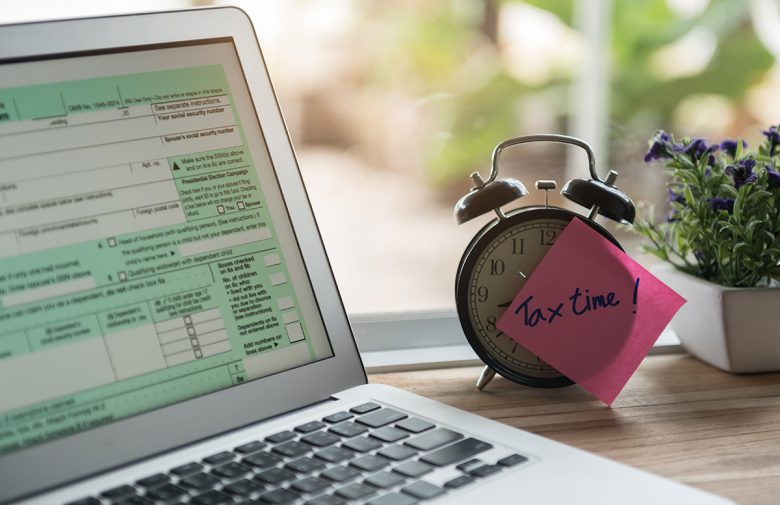Everyone wants to pay as little tax as legally possible, but achieving that can take a little bit of time and work. As tax time arrives, you can maximise your deductions and reduce your tax bill if you follow a few simple strategies. Get started as early as you can, and apply these tips for a hassle-free tax time this financial year.
1. Prepare for the end of financial year
Start preparing for the end of the financial year in the months leading up to the end of June. Get informed about deductions, return lodgement, and the consequences of late lodgement. Keep in mind you can claim a deduction for the costs of managing your tax affairs. This includes the cost of preparing and lodging your tax return and activity statements. It even includes travelling to see your tax adviser.
Your tax return is due by 31 October, but you’ll probably want to lodge earlier than that in case of any errors or omissions you need to correct. If you need to lodge early, you can if you fall into an eligible category. For example, if you’re leaving the country before 1st July, or if you won’t be earning any more income between now and the end of the financial year, you could be eligible. Usually, you need to be a foreign resident who’s leaving permanently or an Australian resident who will no longer be an Australian resident, however, other conditions will apply.
Lodging your tax return late could mean you have to pay a failure to lodge (FTL) on time penalty. The FTL fine varies depending on the size of your business (if you run a business), and the amount of time the return is overdue, so you’ll want to lodge on time rather than leave it overdue for long.
2. Research and claim what you can
Whether you’re preparing your own return or having your tax agent (a qualified accountant) do it for you, it’s important to be aware of what you can claim for deductions. Allowable, work-related deductions include expenses you spent yourself and weren’t reimbursed for, and costs directly associated with earning your income. If you incur an expense for both work and private reasons, you can claim only for the work-related portion of the item.
Examples include vehicle and travel expenses (such as between work and home), gifts and donations, home office expenses, self-education expenses, tools and equipment. By making sure you’re claiming for everything that’s allowable, you’ll avoid paying more tax than you need to.
Using a tax agent might be the easiest way to ensure you’re claiming for everything you can claim for. With an expert doing your tax return, you could also avoid time-consuming mistakes and issues that you need to sort out with the ATO. Tax laws change, so your tax agent helps ensure you’re compliant. Best of all, your tax-agent expenses are tax deductible.
3. Health insurance taxes
Take note of any health insurance taxes you have to pay. This is formally known as the Medicare levy surcharge, and it’s a special tax you have to pay if you earn above a certain income (usually $90,000 for singles and $180,000 for families) and don’t have a suitable level of private hospital insurance. Designed to encourage you to get hospital cover, this levy is different to the Medicare levy. Depending on your circumstances, you might have to pay both.
4. Keep your receipts
You’ll want to keep receipts for tax deductions, but there are some expenses you can claim for without a receipt. The ATO recognises there are certain expenses for which receipts are challenging or even impossible to obtain.
Some of the expenses you might not need receipts for include home-office-related costs, work-related car expenses, and uniform costs. For work-related expenses, you could claim up to $300 without receipts. If you’re working in a home office, you can claim a fixed rate of 45 cents an hour or base your deductions on a detailed diary of actual expenses.
Even in these cases, you’ll need to prove how you calculated all your deductions, and this evidence might include some type of written evidence or a secondary type of record, such as a bank statement. Additionally, the way you calculated your expense needs to be reasonable. So make sure these are genuine expenses and you’re keeping accurate records of your expenses for deductions.
Other things you might be able to claim for with no receipt include membership or union fees, and fuel and petrol if you can demonstrate your work-related kilometres. You might be able to claim for computer items (with a credit card statement and photo), and stationery (with credit card statement and a note next to a purchase record) if you don’t have a receipt.
5. What you can claim from your investment property
If you own an investment property, you can claim a deduction for related expenses. This applies to the period(s) when your property is rented or is available for rent. For example, if you rent out your property half of the year and live in it the rest of the year, you can only claim for expenses for the six-month period it was a rental property.
Related expenses can include management and maintenance costs, including interest on loans; borrowing expenses; depreciation; and capital works spending.
Related expenses, however, don’t cover water or electricity charges paid by tenants, property-purchase costs, or GST credits for anything you buy to lease the property.
6. Claiming mobile phones costs
Mobile phone expenses, like internet and home-phone expenses, can only be claimed where they’re used for work-related purposes. You might be able to claim a deduction on these expenses if you paid for them and you have records to demonstrate the expenses.
If you use your phone for both private and work purposes, you’ll need to calculate the percentage that reasonably applies to the work-usage portion. The ATO will accept proof in the form of a four-week-representative period for the financial year. This could be diary entries and bills for a sample four-week period for the year. You can also use any evidence you have to show your employer requires you to work from home or make work-related calls from home.
Note, if you’re a casual employee, you can’t claim for phone rental expenses. Similarly, if your phone is provided to you by your workplace and your employer pays for it, or if you’re reimbursed for it, you can’t claim it as a personal deduction.
7. How donating can improve your tax return
Being charitable can increase your tax return or reduce your tax bill, so make sure you have a detailed receipt for the donations you’ve made. The charity must provide a Deductible Gift Recipient. Typically, the donation needs to be $2 or more and made to a registered charity to be deductible against your income tax. For example, if you’ve made any gifts of money or property to a nominated fund, institution, authority, class, or other entities, such as schools and other causes, you might be able to claim it as a deduction.
The donation doesn’t have to be in the form of money to be deductible. For example, you could have donated a work of art, trading stock, or even a block of land. If it was a fundraising event, you can claim it if it was a donation of more than $150 made to a deductible gift recipient. Donations made to political parties can be deductible up to a limit of $1,500.
8. Stock up on stationery
Stationery is easy to overlook when tax time arrives. It’s a deductible expense, so the period leading up to end of the financial year is a great time to stock up for the next year – and get the tax deductions almost right away.
For businesses, it’s a great way to offset next year’s stationery costs against this year’s profits. For individuals, it’s an effective way to save on tax rather than waiting another year to claim. If the stationery is a self-education expense, you can claim for it as such. If the stationery you buy qualifies as a tool, equipment, or other asset used for generating your income, you might be able to claim for it.
9. Keep a logbook to claim tax on kilometres
If you use your car for work-related matter, you can claim expenses related to doing your job, as long as your car isn’t owned by your employer or part of your salary package. However, you need to demonstrate your expenses, and the ATO allows you to do so in two ways.
The cents-per-kilometre method lets you claim up to 5,000 km per year per car. If you drive more than that, you need to use the second method to claim. The cent-per-kilometre methods means you use a fixed rate per business kilometre driven, and you work out the total claim amount by multiplying how much you’ve travelled for work this year by the standard rate, which is 66 cents for the 2017/18 year. A diary of your work-related trips is sufficient for this method.
The logbook method uses a given percentage of each car expense. You need to keep a logbook for at least 12 weeks for this approach, and it needs to be updated at least once every five years (in other words, the logbook is valid for tax-deduction purposes for five years). The logbook needs to detail things like the beginning and end dates of the logbook period, the odometer readings, total kilometres, and trip details.
10. Other work related expenses
It’s not always easy to keep track of your deductible work-related expenses, so why not use a tax app to ensure you record everything you need to? The ATO app is free to use and has useful features like the myDeduction tool, which lets you upload your deductions before you lodge through the myTax tool. You can stay organised by physically mailing in your receipts to have them scanned with an app like Squirrel Street (a paid service), or by using the H&R Block Australia app to log your expenses for free.
Other apps to check out include VehicleLog, which lets you easily track your vehicle expenses, and the My Tax app, which features a range of calculators to help you with the slightly more complex tax questions.
Maximise your tax return
Getting it right the first time and lodging on time are vital for complying with the ATO’s tax rules, while knowing everything you’re eligible to claim for is important for minimising your tax bill. Understanding the rules, keeping detailed records, and retaining receipts are habits well worth establishing. With these simple strategies, you could save thousands of dollars or more in taxes over the course of your working life.
SRG Finance is a leading provider of short-term personal finance to consumers all over Australia. We can help you with solutions that the big banks often can’t. To find out more about how we can assist you at tax time with short-term loans, contact us today. Alternatively, you can apply online now



